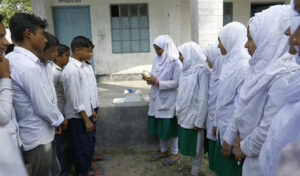 The ongoing COVID-19 pandemic, caused by the novel coronavirus, has crippled people’s way of life globally. Governments around the world have instituted strict guidance and preventative measures to combat the highly contagious disease, including limiting movement, encouraging social isolation, and advising the adherence to six feet of phycial distancing whenever the need to go out arises. The adjustment to this ‘new normal’ has proven to be significantly more challenging for the less fortunate, includingthe poor and extreme poor participants of USAID’s SHOUHARDO III, implemented by CARE Bangladesh; whose worries are not limited to contagion but goes beyond.
The ongoing COVID-19 pandemic, caused by the novel coronavirus, has crippled people’s way of life globally. Governments around the world have instituted strict guidance and preventative measures to combat the highly contagious disease, including limiting movement, encouraging social isolation, and advising the adherence to six feet of phycial distancing whenever the need to go out arises. The adjustment to this ‘new normal’ has proven to be significantly more challenging for the less fortunate, includingthe poor and extreme poor participants of USAID’s SHOUHARDO III, implemented by CARE Bangladesh; whose worries are not limited to contagion but goes beyond.
Families dependent on daily or unstable low paid work lose their jobs, or are forced to isolate because of the COVID-19 outbreak, they have very little to fall back on and worries about life basics, such as putting food on the table, can become a quick reality. At a time when the most basic of survival needs is hard to meet, fulfilling the appropriate handwashing measures can feel like a luxury.
In Bangladesh, the outbreak is hitting youth and adolescents exceptionally hard. With each passing day, their future is less certain and the time to visual and realize their dreams is constricted. The stress and worry about what what degrees to pursue, what jobs to apply for, what to do with their lives is ever present. Schools have been suspended, no one is certain when will they resume again, or how this break will affect their performance. Those who used to support their education through tutoring students from junior classes or other informal work face additional challenges. “I have lost my tuition, my only income source, due to this pandemic. As my family cannot provide for my education expenses, I am sincerely worried about whether or not I will be able to continue studying, and thus, what kind of a future I will have,” says Bayezid, a first-year student of Higher Secondary level, from Tahirpur, Sunamganj district.
SHOUHARDO III has provided vocational training to 9,500 youths, 4,000 of whom have already secured employment. Before the COVID-19 pandemic, the program facilitated three consecutive Job Fairs, catalyzing the youth’s employment process. Unfortunately, these activities are now suspended indefinitely. Just like in other countries, non-essential businesses have ceased in Bangladesh. Buying and selling products or services are no longer as frequent, plumbers, electricians, and others alike have second thoughts about taking jobs. Those who do, are accepting it, and the risks associated with it, out of their extreme need for money.
Piyash, one of SHOUHARDO III’s youth participants, previously received skills training on electrical house wiring. He has been avoiding going to other Upazilas, and now only takes work in his villages. This has reduced his daily income significantly. Rashedul, a new father at 22 years old from Nageswari, Kurigram district, shared his concerns for his family; “I am the only earning member of my family. Due to COVID-19, I have been compelled to postpone all my works. I don’t know how I will be able to feed my newborn baby and meet the nutrients my wife requires for her breastfeeding.” SHOUHARDO III’s COVID-19 response covers multi-purpose cash transfers to 18,975 poor and extreme-poor participants with 12,000 BDT (141 USD) to address basic needs on livelihoods and nutrition for four months.
*this writing is a reflection of information gathered through telephone interviews on youths from SHOUHARDO III working areas.
Written by Iffat Khan, Knowledge Management Coordinator of SHOUHARDO III, CARE Bangladesh.


